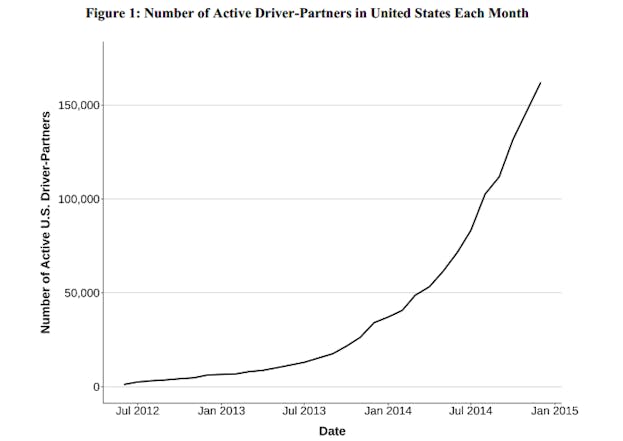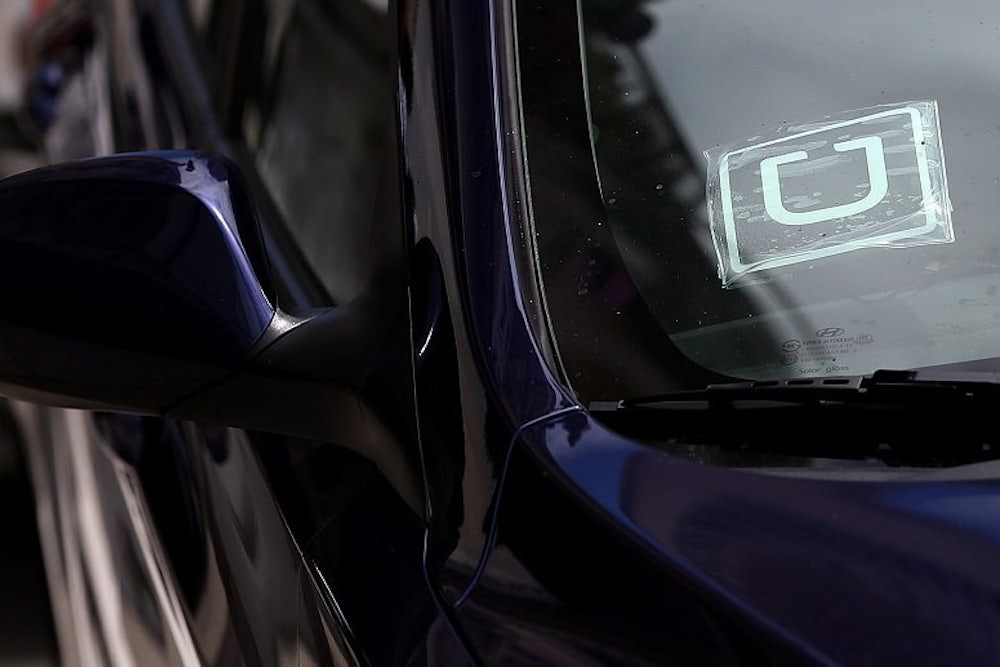Whenever Uber makes a particular claim, journalists rush to disprove it. Sometimes these claims are laughable, like when Uber said its drivers can make $90,000 a year. But others are harder to disprove. Are Uber's drivers, for instance, as happy as the company claims? On Thursday, the company released new data suggesting that the answer is a resounding yes—Uber drivers are very happy, even if they aren’t making $90,000 a year.
In December of last year, the Benenson Strategy Group surveyed 601 Uber drivers over the internet on behalf of the car-sharing company. It’s one of the most comprehensive examinations of Uber drivers to date, but it’s worth noting two things before diving into the data. First, the response rate to the survey was only 11 percent. Second, the respondents, who were granted anonymity to answer honestly, were financially compensated for their answers. That could bias the results to be more positive toward Uber.
Having said that, the results are aren't just positive—they're overwhelmingly so. Seventy eight percent of respondents said they are either very satisfied or somewhat satisfied with Uber, and 69 percent say their opinion of the company has improved since when they started. Seventy one percent said that Uber boosts their income, compared to just 11 percent who said it worsened it. By a 74-5 margin, drivers say that Uber has made their lives better by giving them more flexibility with their schedule. It's unlikely the study's potential biases account for such enthusiastic results.
These drivers are not just working for Uber because they can’t find another job, either: 49 percent worked a full-time job before joining Uber, 10 percent worked multiple jobs, and 26 percent worked at least one part-time job. Only 8 percent were unemployed. And Uber is continuing to grow at a massive pace. In December, the company added almost 40,000 new drivers, a record. They have more than 160,000 active drivers (defined as having provided at least four trips in the month). Across nearly every statistic in the Benenson report, Uber drivers are overwhelmingly happy with the company.

Uber also released a study on Thursday that looked at both the survey and payment data. Don’t just dismiss it as company PR: Alan Krueger, a Princeton economist who served in the Obama administration from 2009-2013, was one of the two authors of the report. (The other, Jonathan Hall, works for Uber.) While Krueger was paid by Uber, he was granted “full discretion over the content of the report.” The study found that UberX drivers—the most affordable Uber option, which most drivers use—earn between $16.37 per hour and $17.56 per hour depending on how many hours the drivers worked. The authors also compared the hourly wages for all Uber drivers with the wages for taxi drivers and chauffeurs from the Occupational Employment Statistics survey. Uber drivers receive more than a $6 hourly wage premium ($19.04 vs. $12.90), although it varies considerably by city. In New York City, the premium is more than $15 an hour. In Washington, D.C., it's less than $5 an hour.
“Of course,” the authors write, “Uber’s driver-partners are not reimbursed for driving expenses, such as gasoline, depreciation, or insurance, while employed drivers covered by the OES data may not have to cover those costs.” For that wage premium to fall to zero, though, Uber drivers’ “after-tax costs [must] average more than $6 per hour.” Those costs may be substantial, but it’s hard to imagine they are, on average, that high. In New York City, with its $15 wage premium, Uber estimates that the costs of being a full-time driver are $15,000 a year—a high amount that still leaves the drivers with an hourly premium of more than $7 an hour. Given all of this, it’s about time to stop obsessing over how much Uber drivers actually make and whether Uber is providing a good job to its employers. Whatever their actual net income, drivers are, on average, happy with their employment situation.
It's also too early to panic about the sharing economy. There’s a growing concern among economists that the jobs that Uber offers—effectively independent contractors—will become more prevalent in the future, and that that could be bad for workers. These jobs, they argue, offer unstable work and poor benefits. Yet, the evidence thus far is weak. “The size of the sharing economy, which is undoubtedly growing as a result of technological advances, is too new to be precisely measured,” Hall and Krueger write in their report. “But the backdrop of trends in contingent and alternative working arrangements reviewed here does not, in itself, indicate flaws in the U.S. labor market on the eve of the sharing economy.”
The sharing economy and Uber drivers' economic situation are worth scrutinizing—as are the above studies. But the existing data suggests that the media has gone too far. Maybe Uber isn’t the devil after all.
